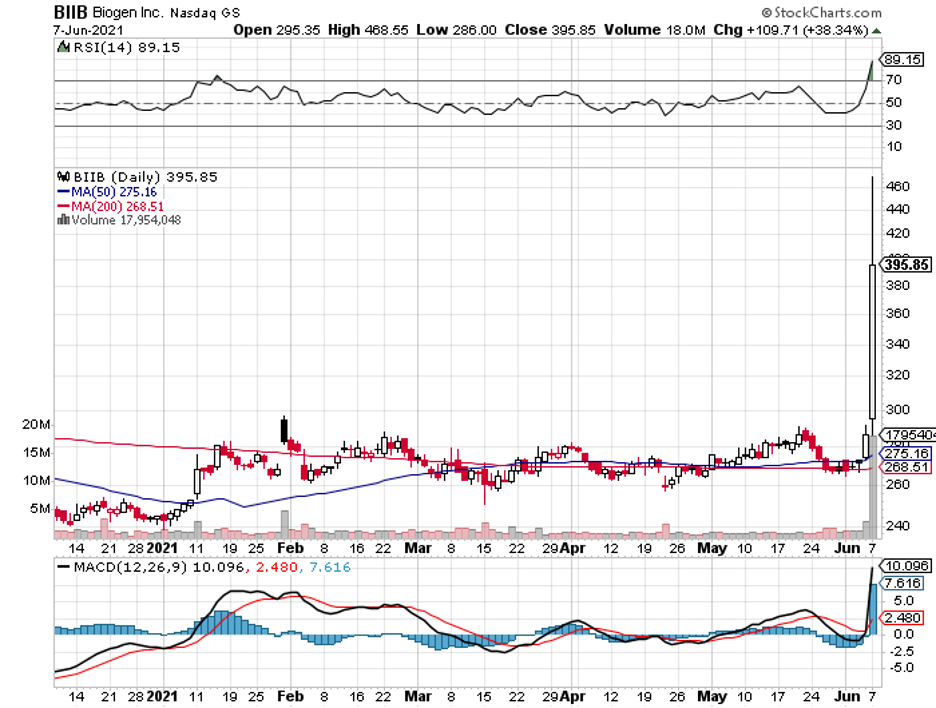The Biggest News in Biotech Today
It’s not typical for stock market news to alter the lives of millions of people across the globe, but this is what Biogen (BIIB) managed to accomplish this week.
The company received accelerated approval from the US Food and Drug Administration (FDA) for its controversial Alzheimer’s disease treatment, Aducanumab.
The drug, which is now marketed as Aduhelm, marks a potential breakthrough medication for over 6 million Americans suffering from the debilitating illness and to possibly billions all worldwide.
Basically, Aduhelm targets what Biogen calls “a defining pathology of the disease” by decreasing the amyloid beta plaque levels in the brains of patients suffering from Alzheimer’s disease.
Biogen shares spiked by roughly 60% following the Aduhelm news, with the pop in the biotechnology stock even more impressive than what was initially predicted.
This latest FDA approval also brings a ray of hope for the biotechnology industry.
Biotech shares have been in a slump this year, with the SPDR S&P Biotech ETF (XBI) falling by 9.2% thus far.
Potential second-order effects of the Biogen win can easily be seen in other developers of Alzheimer’s disease treatments.
Although the moves may not be as dramatic as Biogen’s, several biotech companies benefited from the good news.
Directly benefiting from it is Japanese drugmaker Eisai (ESALY), which has been working with Biogen on Alzheimer’s disease treatment. This company’s American depository receipts climbed by 48.2% after the news broke.
Eli Lilly (LLY), which is also working on its own Alzheimer’s therapy, saw its shares go up 9.3%.
Even Roche (RHHBY), which is still in the early stages of its development of a similar treatment, enjoyed a 1.6% increase, while an under-the-radar biotech company, Denali Therapeutics (DNLI), experienced a 7.8% increase.
Other smaller companies that benefited from Biogen’s news include Sarepta Therapeutics (SRPT), Ionis Pharmaceuticals (IONS), Intercept Pharmaceuticals (ICPT), Cassava Sciences (SAVA), and Annovis Bio (ANVS).
In terms of pricing, Aduhelm is estimated to cost $56,000 per year.
Although there is still no definite number in terms of how much Aduhelm could generate in sales for the company, there have been early estimates prior to this news.
Before this accelerated approval, Aduhelm was projected to add at least $16 billion in market capitalization to Biogen.
If successful, the drug can contribute a minimum of $10 billion in sales annually—a performance that would make Aduhelm one of the best-selling drugs of all time.
At this price point as well, the drug could peak at $5.7 billion by 2027.
Understanding that the cost is too high for some, Biogen has been working on establishing partnerships with healthcare and insurance companies to help patients cover the expenses.
So far, Biogen has been negotiating with Cigna (CI) to come up with terms to make Aduhelm available to Alzheimer’s patients via a value-based contract.
That is, the pricing will be assessed based on how responsive the patient will be to the treatment.
Biogen has also been working on collaborating with CVS Health (CVS) to develop more efficient ways to implement cognitive screenings in urban markets.
The two companies have been looking into boosting testing within underserved communities to improve early diagnosis, with the project commencing by September.
Some cities included in this initiative are Washington, D.C., Los Angeles, Dallas, Chicago, South Carolina, Atlanta, New York, Detroit, and Philadelphia.
Biogen has finally regained its momentum thanks to this accelerated and unprecedented approval.
That means we can expect Biogen to leverage this massive revenue stream to round out the rest of its programs and boost its R&D, as well as possibly compensating its shareholders with share buybacks and even dividends in the second half of this decade.


